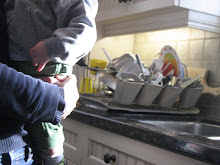My mother-in-law loves to shop and our family has been the beneficiary of her generosity over the years (and since I hate to shop, this is a particularly wonderful gift). She essentially clothes our children, and occasionally I actually have to request that she not go overboard, and remind her that our toddler has an attic filled with boxes of hand-me-downs, and does not need brand new ... well, anything.
This spring, I requested shorts for the two eldest children. And before we knew it, a parcel had landed on our porch. The kids dug in, and discovered piles of clothes, something for everyone; but they assumed all of the "girlie" shorts were for our younger daughter. When I went to take a look, I saw why: the shorts were short. My eldest daughter is not short. In short, the clothes that were meant for her were inappropriate. I do not think my mother-in-law has the slightest intention of turning her seven-year-old granddaughter into a sex symbol--in fact, I'm positive that's not the case. My guess is that those very short shorts were what she found available in the stores, for girls. For boys, shorts continue to be made of comfortable material cut into practical lengths.
My daughter was mildly perplexed: why were the shorts so short? She couldn't wear them to school (which has a finger-length rule), and they weren't much use for playing soccer and doing running club anyway. So, she's been wearing her (one pair) of soccer shorts instead. I just went upstairs and dug through her older brother's drawer and found some shorts that would fit her, too.
And I thought to myself: what is this about? What is the message being sent to girls and not to boys? Here's my reading: girls are (sexual) objects to be decorated, and not active participants. How can you play soccer in teeny-tiny shorts? You can't, really. And you won't look sexy playing soccer anyway, so why would you want to play?
How can we empower our daughters to make decisions that honour their bodies, their aspirations, their desires, their sense of freedom and play, if we are dressing them in clothes that subtly undermine those powerful and positive messages.
I'm not suggesting there's a clothing company conspiracy; the clothing simply reflects what our culture accepts, or even requests, perhaps without even thinking about it. Let's think about it. I'm going to ask my mother-in-law to shop for shorts in the boys' section--for my daughters. Free play for all!
I have a piece in Senses of Cinema
6 years ago

